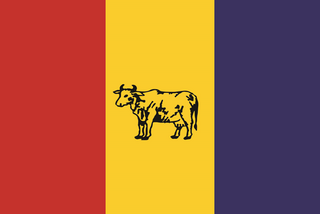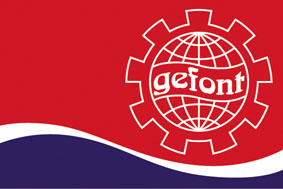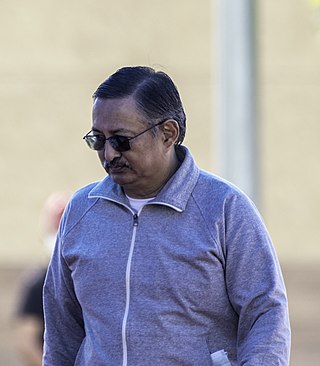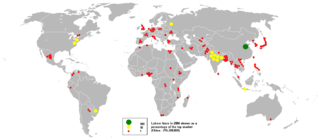
The politics of Nepal functions within the framework of a parliamentary republic with a multi-party system. Executive power is exercised by the Prime Minister and their cabinet, while legislative power is vested in the Parliament.

The Kingdom of Nepal was a Hindu kingdom in South Asia, formed in 1768 by the expansion of the Gorkha Kingdom, which lasted until 2008 when the kingdom became the Federal Democratic Republic of Nepal. It was also known as the Gorkha Empire, or sometimes Asal Hindustan. Founded by King Prithvi Narayan Shah, a Gorkha monarch who claimed to be of Khas Thakuri origin, it existed for 240 years until the abolition of the Nepalese monarchy in 2008. During this period, Nepal was formally under the rule of the Shah dynasty, which exercised varying degrees of power during the kingdom's existence.

The Nepali Congress is a democratic socialist political party in Nepal and the largest party in the country. The party has 870,106 members as of the party's 14th general convention in December 2021 making them the largest party by membership in Nepal.

Nepal Ratna Girija Prasad Koirala, affectionately known as Girija Babu, was a Nepalese politician. He headed the Nepali Congress and served as the Prime Minister of Nepal on four occasions, including from 1991 to 1994, 1998 to 1999, 2000 to 2001, and 2006 to 2008. He was the Acting Head of State of Nepal between January 2007 and July 2008 as the country transitioned from a monarchy to a republic.

Nepali Congress (Democratic) (Nepali: नेपाली काँग्रेस (प्रजातान्त्रिक) was a political party in Nepal, which was formed due to a vertical split of the original Nepali Congress. The Nepali Congress (Democratic) was led by Prime Minister Sher Bahadur Deuba, while the original was led by Girija Prasad Koirala.

The Rastriya Prajatantra Party is a constitutional monarchist and Hindu nationalist political party in Nepal.
Khem Raj Bhatta Mayalu is a Nepalese politician. He is a member of the Nepali Congress (NC) party, the successor party to Nepali Congress (Democratic) [NC(D)] of which he had also been a member while it existed. During the panchayat regime he was the general secretary of the underground leftist group Nepal Janabadi Morcha (NJM), living in exile in Lucknow, India. After the 1985 Nepal bombings, which NJM had claimed responsibility for, Mayalu received a life sentence in absentia.

The General Federation of Nepalese Trade Unions (GEFONT) is a confederation of 20 national trade union federations. It is politically tied to the Communist Party of Nepal. GEFONT declares its goal to be "Socialism for the dignified working-class and prosperous life".
The Nepal Trade Union Congress (NTUC) a national trade union center in Nepal. Founded in 1947, it was the first and largest trade union confederation in country. The NTUC is politically linked with the Nepali Congress (NC).
Tek Bahadur Chokhal is a Nepalese politician and a leader of Nepali Congress. He was elected to the Pratinidhi Sabha in the 1999 election on behalf of the Nepali Congress. He joined the Nepali Congress (Democratic) during the split in the party.
Chitra Lekha Yadav , a member of Nepali Congress, assumed the post of the Minister of Education of Nepal on 25 February 2014 under Sushil Koirala-led government.

Prakash Man Singh is a Nepalese politician and a leader of the Nepali Congress. He is the son of Nepali politician Ganesh Man Singh. He has also served as the Deputy Prime Minister and Minister of Local Development and Federalism in Sushil Koirala's Cabinet.

Bal Krishna Khand is a former, Nepalese politician, former Home Minister of Nepal and a convict of the Bhutanese refugees scam recently unveiled. Khand is a central working committee member of the Nepali Congress party. Khand also served as the Defense Minister of Nepal under the Second Dahal cabinet.

Bimalendra Nidhi is a Nepali politician who serves as a member of the House of Representatives and a senior leader of Nepali Congress. He is the former Deputy Prime Minister of Nepal and Minister of Home Affairs of Nepal. Nidhi has also served as the Vice-president and General secretary of Nepali Congress, for tenures of four consecutive years each.
Nepal Dalit Sangh is a Nepalese Dalit movement linked to the Nepali Congress. When the Nepali Congress was divided and the Nepali Congress (Democratic) was formed, a splinter Nepal Dalit Sangh (Prajatantrik) was formed as the NC(D) Dalit wing by ratifying the Committee of Ratna Bahadur Bishwakarma, Which was already formed as alternative parallel central committee by agitating with organizing committee in Biratnagar 2nd Convention of Nepal dalit Sangh. With the reunification of NC and NC(D) the NDS and NDS(P) were also reunified, and in August 2007 the Nepali Congress appointed a 39-member ad hoc committee of NDS, with Khadga Bahadur Basyal (Sarki) as president and Jeevan Pariyar as general secretary. Founder of nepal Dalit Sangh are Ratna Bahadur Bishwakarma - Dailekh, Dal Singh Kami- Gorkha, Ganesh Pariyar- Kaski, Padma Singh Bishwakarma- Baglung, Bijul kumar Bishwakarma- Dang and Man Bahadur Bishwakarma -Arghakhachi. Nepal Dalit Sangh was born in 2054 BS. Nepal Bikaswonmukh Samaj Sangh was named Before the name of Nepal Dalit Sangh. 2012 AD Nepal Dalit Sangh has done its 4th national convention and Mr. Meen Bahadur Bishwakarma has been elected as president. Nepal Dalit Sangh NDS is one of the leading democratic Organization for Dalit community of Nepal. NDs has a 75 members in body of central committee. Dipak Soni was a secretary in central committee of Nepal Dalit sangh till 2021, from January 2022, Mr. Soni is appointed as acting General secretary and Mr. Bhiusen Damai has been newly nominated as secretary for remaining tenure of NDA central committee. rest of two secretaries are MS. Devika Nepali and Mr. Dharmendra Paswan are also representing to women and madheshi dalit group in the same committee respectively.

Ramjee Kunwar is a Nepal Trade Union Congress-Independent (NTUCI) leader, Senior Vice President of NTUCI and executive member of Nepali Congress Party. He was also the former vice president and secretary of NTUCI and is currently acting president.

Panchayat was an indigenous political system in Nepal that was in place from 1961 to 1990. It placed all governmental power, including power over the Cabinet and Parliament, under the sole authority of the King, effectively making Nepal an absolute monarchy. In addition, political parties were declared illegal.

The revolution of 1951 in Nepal, also referred to as Sat Salko Kranti, was a political movement against the direct rule by the Rana dynasty of Nepal which had lasted for 104 years. It marks the beginning of the political awakening and democratic movements in Nepal, and resulted in immediate abolition of the institutionalized hereditary Prime Minister system in Nepal.

General elections were held in Nepal in two phases on 26 November and 7 December 2017 to elect the 275 members of the fifth House of Representatives, the lower house of the Federal Parliament of Nepal.

Nepal has a labour force of 16.8-million-workers, the 37th largest in the world as of 2017. Although agriculture makes up only about 28 per cent of Nepal's GDP, it employs more than two-thirds of the workforce. Millions of men work as unskilled labourers in foreign countries, leaving the household, agriculture, and raising of children to women alone. Most of the working-age women are employed in agricultural sector, contributions to which are usually ignored or undervalued in official statistics. Few women who are employed in the formal sectors face discrimination and significant wage gap. Almost half of all children are economically active, half of which are child labourers. Millions of people, men, women and children of both sexes, are employed as bonded labourers, in slavery-like conditions. Trade unions have played a significant role in earning better working conditions and workers' rights, both at the company level and the national government level. Worker-friendly labour laws, endorsed by the labour unions as well as business owners, provide a framework for better working conditions and secure future for the employees, but their implementation is severely lacking in practice. Among the highly educated, there is a significant brain-drain, posing a significant hurdle in fulfilling the demand for skilled workforce in the country.














